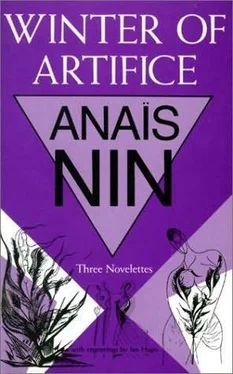Anaïs Nin - The Winter of Artifice
Здесь есть возможность читать онлайн «Anaïs Nin - The Winter of Artifice» весь текст электронной книги совершенно бесплатно (целиком полную версию без сокращений). В некоторых случаях можно слушать аудио, скачать через торрент в формате fb2 и присутствует краткое содержание. Год выпуска: 2007, Издательство: Sky Blue Press, Жанр: Классическая проза, на английском языке. Описание произведения, (предисловие) а так же отзывы посетителей доступны на портале библиотеки ЛибКат.
- Название:The Winter of Artifice
- Автор:
- Издательство:Sky Blue Press
- Жанр:
- Год:2007
- ISBN:нет данных
- Рейтинг книги:4 / 5. Голосов: 1
-
Избранное:Добавить в избранное
- Отзывы:
-
Ваша оценка:
- 80
- 1
- 2
- 3
- 4
- 5
The Winter of Artifice: краткое содержание, описание и аннотация
Предлагаем к чтению аннотацию, описание, краткое содержание или предисловие (зависит от того, что написал сам автор книги «The Winter of Artifice»). Если вы не нашли необходимую информацию о книге — напишите в комментариях, мы постараемся отыскать её.
“A handful of perfectly fold fables, and prose which is so daringly elaborate, so accurately timed… using words as magnificently colorful, evocative and imagist as any plastic combination on canvas but as mysteriously idiosyncratic as any abstract.”
—
The Winter of Artifice — читать онлайн бесплатно полную книгу (весь текст) целиком
Ниже представлен текст книги, разбитый по страницам. Система сохранения места последней прочитанной страницы, позволяет с удобством читать онлайн бесплатно книгу «The Winter of Artifice», без необходимости каждый раз заново искать на чём Вы остановились. Поставьте закладку, и сможете в любой момент перейти на страницу, на которой закончили чтение.
Интервал:
Закладка:
Works Cited
Armstrong, James, and Gary Miers. 2003. Of Obelisks and Daffodils: The Story of Jack Kahane and the Obelisk Press . Portland, ME: Handsack Press.
Bair, Deirdre. 1995. Anaïs Nin: A Biography . New York: Putnam’s.
Cutting, Rose Marie. N.d. Anaïs Nin: A Reference Guide . Boston: G. K. Hall.
Durrell, Lawrence, and Henry Miller. 1988. The Durrell-Miller Letters, 1935-80 . Edited by Ian S. MacNiven. London: Faber and Faber.
Fitch, Noel Riley. 1993. Anaïs: The Erotic Life of Anaïs Nin . Boston: Little, Brown.
Girodias, Maurice. 1980. The Frog Prince: An Autobiography . New York: Crown.
Harms, Valerie. 1986. “Interaction and Cross-Fertilization: Notes on the Influence of Henry Miller on Anaïs Nin’s Early Fiction.” In Anaïs: An International Journal 4: 109-15.
Jason, Philip K. 1984. “The Gemor Press.” In Anaïs: An International Jornal 2: 24-39.
MacNiven. Ian S. 1998. Lawrence Durrell: A Biography . London: Faber and Faber.
Martin, Jay. 1978. Always Merry and Bright: The Life of Henry Miller, an Unauthorized Biography . Santa Barbara: Capra Press.
Miller, Henry. 1988. “About the ‘Mona’ Pages.” In Anaïs: An International Journal 6: 93-103.
Nin, Anaïs. 1939. The Winter of Artifice . Paris: Obelisk Press.
—. 1942. Winter of Artifice . N.p: n.p.
—. 1966. The Diary of Anaïs Nin, 1931-1934 . Edited by Gunther Stuhlmann. New York: Swallow Press/Harcourt, Brace & World.
—. 1969. The Diary of Anaïs Nin, 1939-1944 . Edited by Gunther Stuhlmann. New York: Harcourt, Brace & World.
—. 1973. “The Story of My Printing Press.” In The Publish-It-Yourself Handbook: Literary Tradition & How-To , 39-42. Edited by Bill Henderson. Yonkers: Pushcart Book Press.
—. 1986. Henry and June: From the Unexpurgated Diary of Anaïs Nin . San Diego: Harcourt Brace Jovanovich.
—. 1987. “Into the Heraldic Universe: Letters to Lawrence Durrell, 1937-1939.” In Anaïs: An International Journal 5: 73-98.
—. 1989. “Hans and Johanna.” In Anaïs: An International Journal 7: 3-22.
—. 1996. Nearer the Moon: From a Journal of Love, the Unexpurgated Diary of Anaïs Nin, 1937-1939 . New York: Harcourt, Brace.
—, and Felix Pollak. 1998. Arrows of Longing: The Correspondence between Anaïs Nin and Felix Pollak, 1952-1976 . Edited by Gregory H. Mason. Athens: Swallow Press/Ohio University Press.
P[ollak], F[elix]. 1952. “Anaïs Nin Manuscripts.” In Northwestern Library News 6 (42): 1-2.
Shifreen, Lawrence J., and Roger Jackson. 1993. Henry Miller: A Bibliography of Primary Sources . Ann Arbor, MI, and Glen Arm, MD: Roger Jackson and Lawrence J. Shifreen.
Vaid, Krishna Baldev. 1987. “Writing and Wandering: A Talk with Anaïs Nin.” In Anaïs: An International Journal 5: 49-55.
Van der Elst, Marie-Claire. 1978. “The Manuscripts of Anaïs Nin at Northwestern.” In Mosaic: A Journal for the Comparative Study of Literature and Ideas 11 (2): 59-63.
Zee, Nancy Scholar. 1972. “A Checklist of Nin Materials at Northwestern University Library.” In Under the Sign of Pisces: Anaïs Nin and Her Circle 3 (2): 3-11.
DJUNA
The café table was stained with wine. His blue eyes were inscrutable, like those of a Chinese sage. He ended all his phrases in a kind of hum, as if he put his foot on the pedal of his voice and created an echo. In this way none of his phrases ended abruptly.
Sitting at the café he immediately created a climate, a tropical day. In spite of the tension in me, I felt it. Sitting in a café with his voice rolling over, he dissolved and liquified the hard click of silver on plates, the icy dissonances of glasses, the brittle sound of money thrown on the zinc counter.
He looked like Prokofieff. Like a Chinese sage. Like a German scholar.
“How did you come to meet Johanna?” I asked, thinking that if she were his wife I could not understand her not being there, why she was not there listening to his voice, looking over the book he brought always in his pocket, forgetting to drink because he had been talking about his book which was getting so enormous that it had to be clipped every day.
“I met her in a dance hall. She was working as a taxi girl in a dance hall on Broadway.”
“She must have seemed so different from the other women there.”
“Not at first, and yet when she began to talk… Her talk and her voice. She sat down and she confessed her whole life to me. And what she confessed was all untrue.”
“Will she come back?”
“I don’t know. She’s often made promises like that. She may never come back. For the moment I don’t want her back. I don’t like what happens to me when she’s around. She humiliates me, paralyzes me, it’s torture.”
He opened his soft animal mouth a little, as if in expectancy of a drink.
“Whereas now, Djuna, I’m happy, I’m too happy.” Then he began to laugh, to laugh, with his head shaking like a bear, shaking from right to left as if it were too heavy a head. “I can’t help it. I can’t help laughing. I’m too happy. Last night I spent the whole night right here. It was Christmas and there were too many bed bugs in the hotel room.”
He’s a man whom life makes drunk. He is like me. I was surprised how gently he had walked into my life, how quietly he seemed to be living, when all the time his writing was whipping and lashing around, coursing like lava with burning bitterness and caricature. His softness of speech could not temper the watchful curiosity of his analytical blue eyes. Beneath the furry human warmth I sensed a non-human purpose. Behind this Hans with his southern roguishness wearing his hat tipped to one side and perpetually calling for drinks, I divined a more austere personage bent upon creation.
“Johanna… Johanna wanted to kill me for all that I wrote about her.”
“It is a very cruel book.”
“But she’s a terribly cruel woman.”
“I admire her courage to hurt… After all, she fed your work. She gave you a tremendous experience.”
“You’re only thinking of me as a writer,” he said, and then I knew that this was not so because while he talked I had been noticing that he was very thin, that although his voice was warm and ample, his body was thin, and that at forty his hair was almost white, and I knew that if Johanna had been good for his novels, I wanted to be good to him, to Hans the man who was hungry, thirsty, abandoned.
“When I read your novel about Johanna and Hildred, do you know what struck me as strange, Hans? That you the husband, lover, writer, should have been such an indistinct personage. You made the portrait of the two women full length, with bold, emphatic strokes. But when it came to yourself, you made yourself out an abstraction, just a writer, observing, noting, suffering, yes, but all of it furtive, modest, self-effacing. Why? It is as if Johanna crowded you out, as if you considered yourself unimportant except as a recorder, unimportant as a man, I mean. I couldn’t find you. I could only find a man who was telling a story.”
“Always thought of myself as unimportant… I’ve lived so blindly. No time to think much. Tons and tons of experience. Johanna always creating trouble, misery, changes, flights, dramas… No time to digest anything. And then she says I die when she leaves me, that pain and war are good for me. All the time I’m with her I’m choking with anger. After scenes with her I get terrible pains in the pit of the stomach.”
Читать дальшеИнтервал:
Закладка:
Похожие книги на «The Winter of Artifice»
Представляем Вашему вниманию похожие книги на «The Winter of Artifice» списком для выбора. Мы отобрали схожую по названию и смыслу литературу в надежде предоставить читателям больше вариантов отыскать новые, интересные, ещё непрочитанные произведения.
Обсуждение, отзывы о книге «The Winter of Artifice» и просто собственные мнения читателей. Оставьте ваши комментарии, напишите, что Вы думаете о произведении, его смысле или главных героях. Укажите что конкретно понравилось, а что нет, и почему Вы так считаете.











